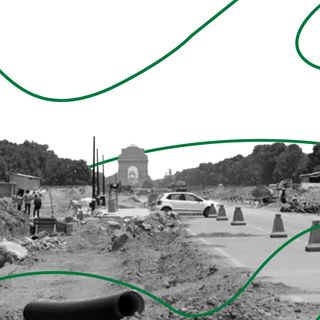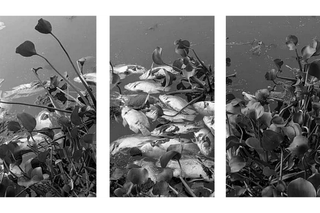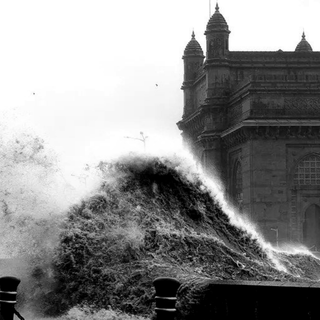
Hundreds of Fish Died in a Bengaluru Lake Due to Industrial Waste
The inflow of chemicals from industries and agricultural fields into the Mottanalluru Lake has led to fish deaths over the past week.

For the last one week, hundreds of dead fish are floating in Bengaluru’s Mottanalluru Lake — forcing locals to live with the stench as calls to the city’s civic authorities for help went unanswered due to the pandemic-prompted lockdown on the city.
The inflow of chemicals from neighboring industries and agricultural fields into the lake is believed to be responsible for the mass fish die-offs. Not only that, even the dumping of garbage from hundreds of apartment blocks around the lake is blamed for killing the lake’s biodiversity over time, rendering its water unusable, and killing fish.
“We first saw dead fish floating on the lake surface on Monday. Multiple calls were made to officials of Karnataka State Pollution Control Board (KSPCB) [and other authorities]… only to hear that no one could come owing to the lockdown,” a local resident told The New Indian Express. When the stench started becoming unbearable, they had to contact lake activists and post their plight on social media to get authorities to respond, the resident added.
However, this is not the first incident of fish dying in lakes of Bengaluru due to pollutants in the water. In February, thousands of dead snails were found in Kudlu Dodda Kere, a 40-acre water body, due to a sewage pipe discharging dirty water into the lake.
Last May, too, dead fish had surfaced in the city’s Kommaghatta Lake. “During the past two months, it has become difficult for residents to even breathe because of the intolerable stench. We cannot open our doors and windows,” Vijay T., a resident of the area, had told The New Indian Express.
Related on The Swaddle:
India’s Pollution Regulators Are Ineffective Due to a Lack of Expertise, Resources: Report
When the locals approached authorities for a solution, the Bangalore Development Authority (BDA) and the local panchayat reportedly shifted blame onto each other. “This was once a beautiful freshwater lake, and hundreds of people would visit it. Gradually, the lake started to worsen with sewage and garbage being dumped. There was also no one to look after the lake,” Sanjeev Kumar, another resident of the area, said.
Believed to be the third most populous city in India, Bengaluru is also among the fastest-growing cities in the world — but the growth has taken a toll on nature. The rapid urbanization and industrialization over the past few decades have, reportedly, led to large amounts of domestic and industrial waste being dumped into the city’s water bodies. In the meantime, authorities haven’t simultaneously kept up with their efforts to safeguard Bengaluru’s lakes. “It’s no rocket science. The lakes don’t have a self-cleaning mechanism. Someone has to do it manually,” Leo Saldana, convenor at Environment Support Group, a social justice initiative, had told LiveMint in 2016, commenting on mass fish die-offs in the city’s centrally-located Ulsoor Lake.
The cost of rapid urbanization is one other cities across India are also bearing. From heavily polluted rivers to escalating air pollution — the latter has also been linked to a higher rate of Covid19-infection in the national capital — cities are plagued with natural degradation. More than 35 million Indians suffer from water-borne diseases like typhoid, cholera, and hepatitis every year. “We have been requesting the officials to take water samples and control the entry of pollutants. The villagers depend upon the lake water, which should be protected,” Kavitha Reddy, a lake activist from the city, who has been assisting the residents around Mottanalluru lake, said.
Residents of Bengaluru have filed complaints of negligence and subsequent inaction by civic bodies for a while. Last October, the National Green Tribunal (NGT) had directed BDA, KSPCB, and a host of other bodies to clear up dead fish in Bengaluru’s Bellandur Lake after, acting upon the complaint of locals. In fact, the NGT had also criticized civic officials for not only failing to discharge their duties, but also lying about measures to control the entry of sewage into water bodies being in place — all this, to no avail. “…the officials are asking us to deal with it for some more days [due to a long-holiday weekend]. They are refusing to follow the NGT committee orders… How can the government officials be so relaxed about it?” the residents had told the media.
However, while individual instances are subsequently dealt with, the pattern keeps repeating itself as dead fish continue to surface across different lakes in the city. “It’s time Bengaluru lakes had a conservation-focused standard operating procedure,” Reddy, who believes the poor maintenance of lakes by civic bodies is behind instances like this, told The Times of India earlier this year.
Devrupa Rakshit is an Associate Editor at The Swaddle. She is a lawyer by education, a poet by accident, a painter by shaukh, and autistic by birth. You can find her on Instagram @devruparakshit.
Related


Cyclones Like Tauktae Are Becoming More Intense Due to Climate Change, Researchers Say
